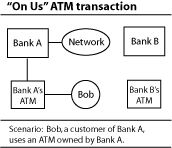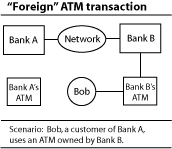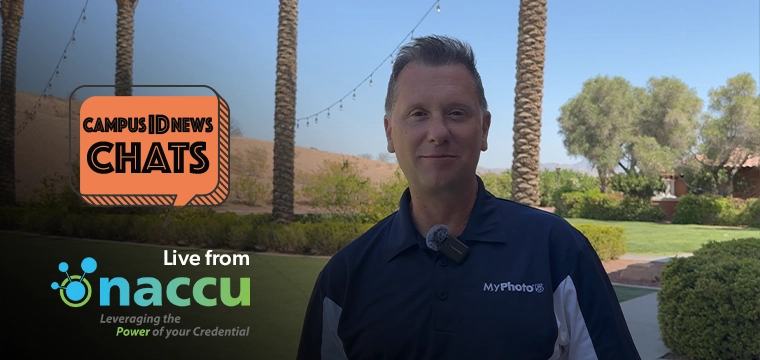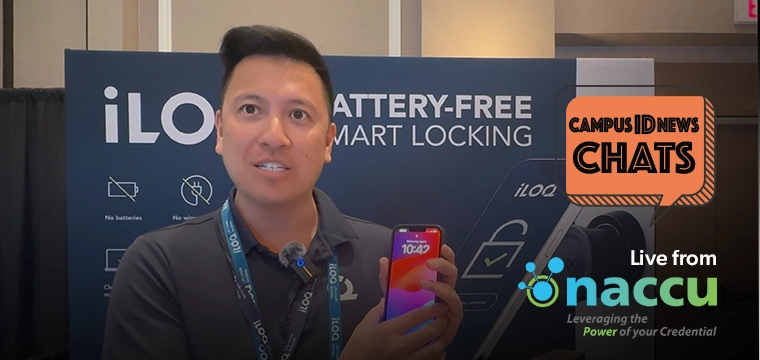 The selection of a campus card banking partner nearly always involves a consideration of fees. Financial institutions charge fees to customers and non-customer users of their services in order to stay in business and build value for their shareholders. Campus decision makers typically want to minimize fees charged to their student cardholders and/or share in the fees collected. So the potential partners often find themselves at cross purposes.
The selection of a campus card banking partner nearly always involves a consideration of fees. Financial institutions charge fees to customers and non-customer users of their services in order to stay in business and build value for their shareholders. Campus decision makers typically want to minimize fees charged to their student cardholders and/or share in the fees collected. So the potential partners often find themselves at cross purposes.
A ubiquitous fee that has received almost constant attention and debate nationwide is the ATM usage fee. It has been the subject of industry regulation, consumer upheaval, and legislative action. In the end, it comes down to economics … and an understanding of the basic economics of the ATM market can help the campus card administrator better evaluate banking partnerships.
The first thing to consider are the parties involved in an ATM transaction: the cardholder’s bank, the ATM network, and the ATM owner. Each of these parties incurs costs when a cardholder uses an ATM. It is only logical that each of these parties levies fees to cover their costs and make money.

When a cardholder uses an ATM that is owned by their bank, the transaction is called an “on us” transaction. No other bank or ATM owner is involved in the transaction so only the ATM network and the cardholder’s bank are entitled to fees.
When a cardholder uses an ATM that is owned by another bank or private ATM owner, the transaction is called a “foreign” transaction. In such a case, all three parties incur costs and thus levy fees. The ATM owner has the costs associated with deploying and maintaining the machine, the network uses its infrastructure to route the transaction, and the cardholder’s bank must approve and moderate it.

With “on us” transactions, the costs are most often absorbed by the cardholder’s bank as a service to their customer. Foreign transactions, however, typically result in two separate fees to the cardholder.
First, a fee called a surcharge is levied at the time of the transaction. This fee is detailed on-screen at the ATM, usually taking a form such as, “the owner of this ATM charges a $1.50 fee for use of the device.” The cardholder is asked to accept or decline the fee and, subsequently, the transaction. This fee is shared between the ATM owner and the network.
A foreign transaction also commonly results in a second fee assessed by the cardholder’s bank. This fee appears in the monthly statement and is designed to cover the expenses that the cardholder’s bank incurs during the transaction. This fee is set by the cardholder’s bank though a portion of it is shared with the ATM owner.
For years there have been consumer complaints that ATM owners were, in essence, double-dipping by surcharging and sharing in the foreign fee collected by the cardholder’s bank. There were pushes to ban surcharging brought from many levels (in fact, surcharging was not allowed in the early days of ATMs).
The reality, however, is that this it is the surcharge that has enabled ATM deployment to proceed to the extent it has occurred. Without surcharges, it would be difficult to make money deploying and operating the devices. The surcharge has changed this and created a major business in ATM operation. This has led to significant convenience–with an ATM on almost every corner. Consumers can avoid fees by using devices deployed by their bank, but they can also benefit from the convenience of ready access if they are willing to pay the additional fees.
The campus card perspective
For campus card programs, understanding on us and foreign ATM transactions can help us to better serve our customers when it comes to banking partnerships. For our customers to take advantage of “fee-free” transactions, their should be partner-owned ATMs available for student use. And you should understand the fees that the prospective partner charges for both types of transactions. Only with this understanding can you evaluate the true cost to the student of the banking services.




